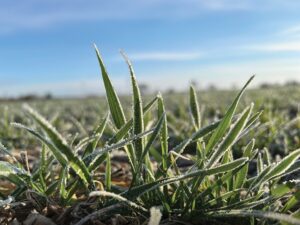Research at GFO
FUNDING PROJECTS, CREATING PARTNERSHIPS AND LOOKING LONG-TERM
discovering practices that reduce on-farm nitrogen costs, minimize the impact of pests like Western bean cutworm and improve wheat genetics for more Fusarium resistance are all examples of Grain Farmers of Ontario’s activities in research.
Last year, GFO invested $1 million in research projects that benefit farmers. This level of investment expands and improves important agricultural research in the province along with making GFO an important influence in the world of agricultural research.
With such a large amount of producer dollars being invested, GFO is very careful to ensure money is spent on projects that are a priority to Ontario farmers. The first stage in setting the research priorities that drive funding decisions each year is a survey of delegates at the Annual General Meeting. Elected farmer-delegates are surveyed on their opinions of where GFO should focus our research dollars.
“The delegate survey is our most important tool for determining what priorities to focus on,” says Joe Hickson, chair of the Research Committee which is comprised of both directors and delegates. “We also follow up this survey with consultations with crop specialists and industry experts. The GFO research committee has in-depth discussions based on all of the information to ensure priorities match both short- and long-term needs.” The research priorities for 2010-2011 are:
• Crop quality and expanded utilization
• Breeding and the development of new genetics
• Agronomy and production challenges
• Insect and disease prevention and control
calling for projects
Staff in the research department at GFO use these priorities to guide all of their activities. GFO funds are distributed in a variety of ways but most go through a specific process that begins with a Call for Proposals. “A call for proposals lets researchers know that GFO has funds available to support projects,” explains Meghan Moran, Research Coordinator with GFO. “This is our way to communicate GFO’s priorities to researchers and invite those with projects that align with our farmers’ needs to apply for funding.”
When project proposals are received, the Research Committee reviews them and makes recommendations on which projects to fund to the Board of Directors. Projects such as those featured on page 24 and 30 go through this process.
Coordinating requests for proposals and monitoring projects is mainly the realm of the newest member to GFO’s research team: Meghan Moran. For approved projects involving agronomy, production, insects and disease, Moran works with the researchers to monitor the status of the project. This careful monitoring ensures that GFO funds are being spent appropriately and allows the organization to communicate research breakthroughs and results to farmers in a timely manner. Moran hails from Paris, Ontario and she recently completed her Masters degree, which focused on herbicide effectiveness, with Drs. Clarence Swanton and Peter Sikkema at the University of Guelph.
creating partnerships
Calling for proposals and funding projects is only one method of supporting agricultural research in the province. In some cases, GFO needs to seek out partners and create projects in order to fulfill the requests and priorities of our members. “When a topic is determined as a very high priority but requires an approach that incorporates the entire value chain, we often create partnerships and find external funding to accommodate that need,” says Alison Walden-Coleman, Research Projects Lead at GFO.
One example of this collaboration is wheat quality research. “Some of our end-users have specific quality requirements and we understand how important it is to meet their needs,” says Walden-Coleman. “To ensure the requirements are being met, GFO facilitated partnerships with researchers and industry from both ends of the value chain,” she says. The partnership involves seed companies, Hyland Seeds, a division of Dow AgroSciences and C&M Seeds; end-users, Kelloggs and Kraft; and researchers, Dr. Koushik Seetharaman from the University of Guelph and Mike Reimer from the Canadian International Grains Institute, along with the Ontario Cereal Crops Committee.
The partnership formed a project and accessed government funding through the Canadian Agricultural Adaptation Program. GFO was the lead applicant to receive this funding and staff were primarily responsible for coordinating and submitting the lengthy proposal. Research as a result of this collaboration is currently underway in Seetharaman’s lab in Guelph and Reimer’s lab at the CIGI facilities in Winnipeg.
Facilitating and creating such partnerships falls into the purview of the Research Projects Lead at GFO. Walden-Coleman is also responsible for coordinating and monitoring projects that fall into the Utilization and Breeding priorities. She has worked at GFO since 2008 and has a Masters degree that focused on drought tolerance in soybeans at the University of Guelph.
finding funds
Developing partnerships and accessing government funds as the department did for the wheat quality research are common activities. “We want to maximize every farmer-dollar we invest,” says Crosby Devitt, Manager of Research and Market Development. “To do that, we often access government and industry research dollars for projects we support.”
There are many different avenues available to access funding. In some situations, staff liaise with and assist researchers who require additional funding to help them access government and industry funds. Alternatively, staff have close connections with government personnel and can find projects that fit within new or current funding programs. For example, a current and important government funding program available is the Farm Innovation Program (FIP) which has made $2.3 million available for corn, soy and wheat research through the federal and provincial Growing Forward program. Projects supported by GFO and FIP are featured on page 32.
thinking long-term
Beyond finding and funding research projects that will benefit Ontario farmers, the research department at GFO is also focused on representing farmers within the greater research community and encouraging a healthy future for agricultural research in the province.
“Part of our job is to improve agricultural research for the long-term,” says Devitt. “We need to look beyond current funding programs and current challenges and create an environment where agricultural research can thrive.”
An opportunity to both conduct important research and encourage positive change in the research world presented itself recently. GFO has been an integral player in the creation of a national and interdisciplinary partnership that focuses on breeding and genetics for five important crops in Eastern Canada. With industry and public research partners from Manitoba, Ontario, Quebec and the Maritimes, this collaboration was able to access $4 million from the Agriculture and Agri-Food Canada program Developing Innovative Agri-Products as part of the Growing Forward initiative along with $1.8 million from industry partners.
“An individual researcher is only linked to so many other researchers,” says Devitt. “But, with this project, we have created linkages where they have never existed before across provinces and across scientific disciplines. I think this collaborative approach represents where agricultural research will be heading in the future.”
beyond funding projects
Research at GFO goes beyond simply funding projects as both staff and directors represent farmers’ interests on a number of industry and government avenues. For example, Devitt is heavily involved with the variety registration process and the performance trials for corn, soybeans and wheat.
GFO is also involved with additional regulatory processes. “We have representatives on several committees that are involved in the registration of herbicides, insecticides and new GM traits,” says Devitt. “We’re on these committees to ensure that the farm-level is considered before decisions are made,” he continues.
Beyond regulation, GFO also works with the government in an effort to align provincial and federal research priorities with our own; ensuring that Ontario farmers are in the forefront when decisions are made.
“As public research is being cut back across many disciplines, it’s a challenging job,” says Devitt. “But, we’ve made progress in impacting government research priorities and we will continue to work hard to represent farmers.”•
























